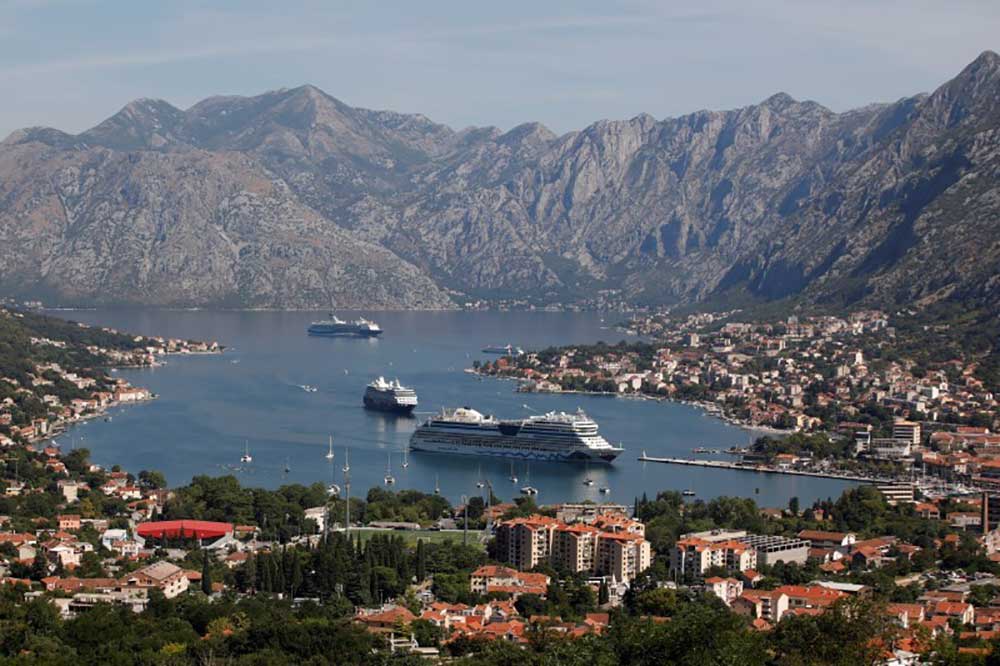KOTOR, Montenegro. – A UNESCO World Heritage Site nestled on the edge of a picturesque Adriatic bay, the town of Kotor in Montenegro is struggling to cope with a surge in tourism that is clogging its narrow streets and raising environmental concerns.
Many visitors arrive on the hundreds of boats, yachts, and cruise ships that dock daily in Kotor’s harbour, leading some people to call for a hike in the 1-euro ($1.09) fee that visitors from cruise ships are charged to enter the town.
The number of annual cruise ship arrivals has risen steadily over the past decade, with about 500 expected this year. On Wednesday alone, four cruise ships carrying about 5,000 tourists moored in the town, which featured in the 2006 James Bond film “Casino Royale”.
While tourism contributes roughly a quarter of Montenegro’s economic output, Kotor’s 23,000 inhabitants are feeling the strain.
“Traffic jams are huge,” said Doris Dajkovic, who works in a local souvenir shop.
A series of protests against excessive tourism has erupted in leading European destinations this year, including Venice in Italy, Barcelona in Spain and Santorini in Greece.
Local people say too many visitors drive up housing costs, pricing residents out of the market, and cause congestion and other environmental problems.
“The life of our neighbors is becoming increasingly difficult during the tourist season,” said Jovan Ristic, director of the local tourist organization, who backs an increase in the cruise ship visitor fee.
“All similar tourist destinations are working on reducing or selecting passenger ships and seriously collecting excursion fees,” Ristic added.
In a world first, Venice introduced a 5-euro ($5.44) charge in April for daytrippers arriving on particularly congested days, hoping the levy would deter some people from visiting.
The surge in mass tourism is also taking a toll on the local marine environment.
“Such a number of cruisers requires a study to determine the maximum environmental load,” said Milica Mandic, a scientific advisor at Montenegro’s Institute of Marine Biology.
In neighbouring Croatia, the UNESCO-listed resort of Dubrovnik introduced a “Respect The City” plan in 2017, capping the number of cruise visitors to 4,000 at any given time.
Unless EU aspirant Montenegro adopts a new economic growth strategy that would boost productivity and human capital, its incomes will not converge with average EU levels in the next 40 years, the World Bank earlier warned.
The tiny Adriatic country, which started EU accession negotiations in 2012, hopes to speed up its integration with the wealthy 27-member bloc after adopting a comprehensive set of legal frameworks aligned with the European Union.
But its growth strategy, which so far has been based mostly on attracting a few large investment projects in transport, energy or tourism, has left the economy more vulnerable to external shocks, making it hard to maintain an average 3 percent growth rate, the bank said in a report.
The bank said that stagnant productivity growth was caused by market inefficiencies in the service sector which represents over 70 percent of GDP, and that Montenegro needed to remove regulatory barriers for firms to enter markets and grow.
Most companies lack innovation and invest little in green technology which is needed to sustain tourism growth and develop Montenegro’s comparative advantage in clean energy. Only 8 percent of firms have implemented energy efficiency measures compared with 25 percent in peer countries.
Also, a better leverage of trade is needed as travel and tourism services account for 80 percent of total exports, the bank said, cautioning however that export diversification itself is limited by the low productivity of Montenegrin firms which reduces their competitiveness in foreign markets.
In addition, Montenegro must tackle its income inequality which shrinks the pool of future skilled workers and entrepreneurs and limits its labour productivity growth potential, the bank said.
“By implementing these reforms, Montenegro can expect a thriving private sector, significant job opportunities and ultimately improved wages and benefits for all its citizens,” said Christopher Sheldon, World Bank Country Manager for Bosnia and Montenegro.





